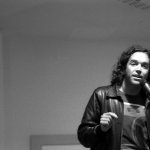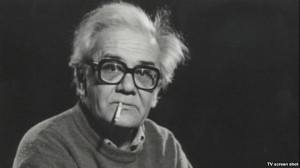Four poems from the Chilean poet Enrique Winter, translated by Mary Ellen Stitt
El piso sucio y la luz prendida
by Enrique WinterNingún servicio es tan básico, ni la luz ni el agua
y si de noche la ciudad pestañea sus brillos
tanto mejor se ve a oscuras. El ojo se acostumbra a todo.
El viaje en bus durará algunos meses
se habituará a dormir sentado, al pan con jamón y al café,
a ser discreto como un lago
y no como esta lluvia sobre el techo de cinc.
Un poco de baba sobre la almohada
que diga “aquí durmió”
repetirá temas siempre variables
como el clima y su opinión del país extranjero,
porque usted está en contra de la belleza que se note
―que parezca agarrable como un plato:
Andrés lava su auto en un pasaje
de Lima, Monterrey o de Santiago,
su esposa es güera o rubia como un sable.―
El bus, en cambio, es un país donde están de paso todos,
un poco trasnochados y malolientes
donde nadie hace el amor ni en los asientos ni en los baños.
Dirty Floor and the Light Stays On
by Enrique WinterNo utility is that basic, not power and not water
and if the nighttime city blinks out its glow
we see so much the better in the dark. The eye can get used to anything.
The bus ride will go on for months
you’ll grow accustomed to sleeping in a seat, to bread and ham, to coffee,
to being discreet like a lake
not like the rain on this metal roof.
A little drool on the pillow
announcing “—slept here”
you’ll repeat constantly variable topics
like the weather and your opinion of this foreign country,
because you are against conspicuous beauty
—which looks there for the taking, like a dish:
Andrés washes his car on a private street
in Lima, Monterrey, or Santiago,
his wife is fair, blonde as a saber.—
The bus, on the other hand, is a country where everyone is passing through
a little sleep-deprived and beginning to smell
where no one makes love: not in the seats, not in the bathroom.
translated from Spanish by Mary Ellen StittRitos de paso
by Enrique WinterAndrés repasa mentalmente lo que Miguel recién le dijo:
―Cuatro son las amigas de tu novia
en su primer trabajo. De veintiséis son justo esas cuatro
las que tienen jardín.―
Brillante como escupo sobre escarcha.
Miguel dice que todo lo que soy es anterior a que naciera,
que con saber el sueldo de mi padre, podría haber predicho
los invitados a este cumpleaños.
Nada me constituye, y si lo hay, no cambia a los presentes
que visitaron Cusco y Memphis con sus papás, pero encontraron
a su mujer en el colegio.
Yo no la conseguí allí, sino como gerente
y por eso llevamos cinco años y no diez en el cine.
Agrega que a mi matrimonio no irá ninguno de los pobres que ayudo,
ni los que ordeno como cartas de bridge o futbolistas de consola.
Ni yo, ni nadie que frecuente, ha decidido algo alguna vez.
La crueldad con que me juzga no tiene nombre
y por eso la olvido. Siempre fui igual y preferible
al severo Miguel que un día
dirá―fui todo, nada vale
la pena.
Rites of Passage
by Enrique WinterAndrés turns over in his mind something Miguel recently said:
―Your girlfriend has four friends
from her first job. Out of twenty-six it’s exactly those four
who have lawns.―
Brilliant like spit on frost.
Miguel says everything I am is prior to my birth,
that given my father’s salary, he could have predicted
all of the guests at this birthday party.
I stand on nothing, and even if I did, that wouldn’t change the people present here
who have been to Cuzco and Memphis with their parents but met
their wives in high school.
I didn’t find mine there but later, as a manager
so we’ve spent five years and not ten together at the movies.
He adds that none of the poor people I help will come to my wedding,
nor will those I arrange like bridge cards or sports figures.
Neither I nor anyone here has ever decided anything.
The cruelty with which he judges me is nameless
so I forget it. I have always been the same and preferable
to severe Miguel, who someday
will say―I’ve been everything, nothing
is worth it.
translated from Spanish by Mary Ellen StittMantra
by Enrique WinterCon las heridas de los dedos pinto
unos cuadros que compran a buen precio
quienes me las hicieron.
Mantra
by Enrique WinterWith the wounds of my fingers I paint
works that are bought at a good price
by those who left me bleeding.
translated from Spanish by Mary Ellen StittTres cajas vacías
by Enrique WinterFilipino, bigote blanco y largo
Ya nadie viene al cementerio, Marco,
a excepción de ti, que hace cinco años
jubilaste y perdiste a un hijo sano.
Hoy barres tumbas como voluntario.
Tres meses sin la regla como los tres semáforos en rojo
Espera un hijo como quien espera el bus
a las cinco de la mañana. Un hijo
que morirá atropellado como Marco Antonio Vidal Parraguez,
muerte de la cual nos enteraremos quince días tarde.
El cuerpo un recipiente de pisco y líquido amniótico,
porque le parece obvio no haberse embarazado:
tres meses sin la regla como los tres semáforos en rojo
que Marco cruzó antes que tumbaran su cara de NN
viviendo mientras tanto.
Cuarenta y cinco años, calvo: treinta y cinco atendiendo
a esta familia que vota por el enemigo y cría
a quien quiere encamarse con la futura madre,
que de las drogas duras va y vuelve al alcohol
como un columpio con un niño.
Tu tenías uno, Marco, pero de eso nunca hablaste.
Dos bajo el par
Se suicida un amigo allá en Colombia
y en la noche de plaza a mi pareja
la bendicen las manos vagabundas
con la caja de vino. Flota mares,
como muerte navega acompañada,
llegó a esta pieza y no se irá tan fácil.
No puedo hacer el amor entre muertos:
Patricio Hernández, profesor de nado,
más Alejandro Galvis, el poeta,
son desde hoy puñado de cenizas,
como las del cigarro que ella apaga
conmigo en los moteles de Santiago.
Three Empty Boxes
by Enrique WinterFilipino, long white mustache
No one comes to the cemetery anymore, Marco
but you, who five years ago
retired and lost a healthy son.
Now you sweep graves as a volunteer.
Three months without a period like three red traffic lights
She’s expecting a child like someone waiting for a bus
at five o’clock in the morning. A child
who will be trampled to death like Marco Antonio Vidal Parraguez,
a death we’ll learn of fifteen days too late.
Her body a receptacle for liquor and amniotic fluid,
because she’s sure she couldn’t be pregnant:
three months without a period like the three red traffic lights
that Marco ran before they struck down his anonymous face
living while life passed him by.
Forty-five years old, bald: thirty-five serving
this family that votes for the enemy and brings up
a son who wants to lay this future mother
who goes from alcohol to hard drugs and back
like a child on a swing.
You had one, Marco, but you never spoke of that.
Two under par
A friend commits suicide back in Colombia
and in the plaza’s night my lover
is blessed by vagabond hands
with a box of wine. It floats across seas,
as death sails accompanied,
arrives in this room and won’t leave so easily.
I can’t make love among dead bodies:
Patricio Hernández, swimming teacher,
and Alejandro Galvis, the poet,
are now a fistful of ashes,
like those from the cigarette she puts out
with me in the motels of Santiago.
translated from Spanish by Mary Ellen Stitt

